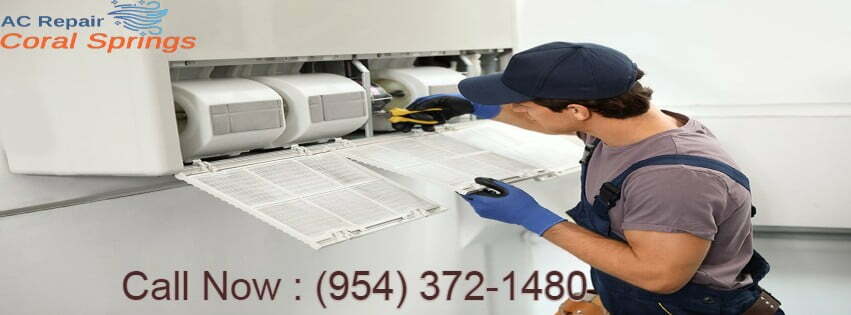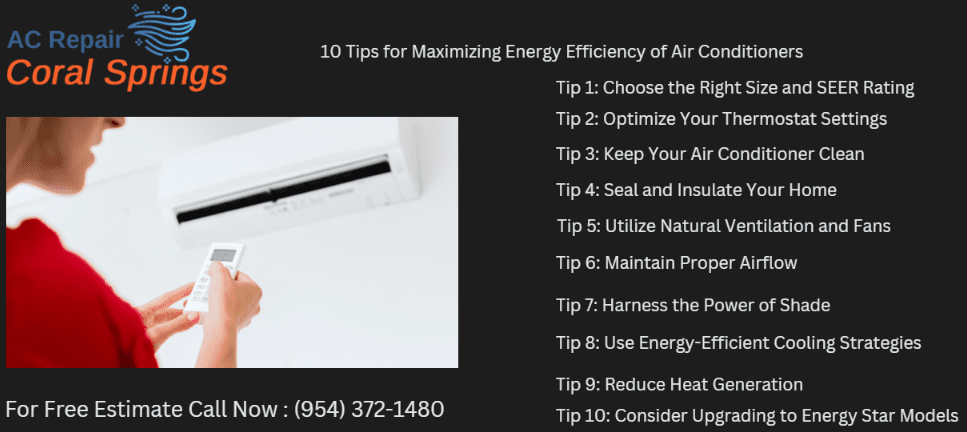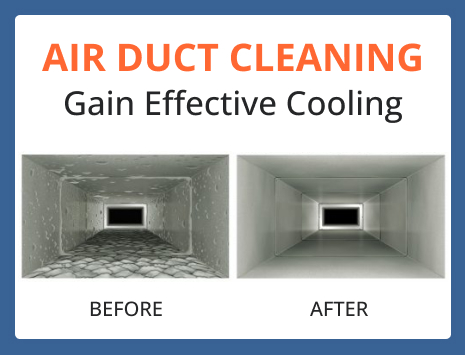
In the sweltering heat of summer, air conditioning becomes a lifeline for many households. However, the constant use of AC can have drawbacks, impacting our health, the environment, and energy bills.
Today, we’ll explore effective strategies to mitigate the negative effects of air conditioning and create a healthier, more sustainable indoor environment. Besides, if you ever encounter issues with your AC unit, contact AC Repair Coral Springs specialists for expert assistance in keeping your system running smoothly.
-
Optimize Air Conditioner Settings:
Setting your thermostat at optimal levels is crucial to minimize energy consumption and maximize efficiency. During the warmer months, aim for a temperature between 72 and 78 degrees Fahrenheit that balances comfort with energy savings.
By programming your thermostat or investing in a smart AC system, you can ensure your home remains cool when needed without unnecessary energy wastage. It not only reduces your carbon footprint but also saves on utility bills in the long run.
-
Improve Air Circulation:
Enhancing air circulation within your home is another effective way to reduce reliance on air conditioning. Ceiling or portable fans can be invaluable assets in moving the air, distributing cool air more efficiently, and creating a more comfortable environment.
Additionally, strategically opening windows and doors can promote cross-ventilation, allowing fresh air to flow through your home and dissipate accumulated heat. These simple practices can help lessen the strain on your AC system and improve overall indoor comfort.
-
Maintain Your Air Conditioner:
Regular maintenance is the key to ensuring your air conditioning unit’s optimal performance and longevity. By staying proactive with maintenance, you can extend the lifespan of your AC unit and enjoy reliable cooling for years. One of the most important maintenance tasks is to clean or replace filters regularly, as clogged filters can obstruct airflow and reduce efficiency.
Additionally, check for any signs of wear or damage and address them promptly to prevent minor issues from escalating into costly repairs. Scheduling annual inspections and tune-ups with AC Repair Coral Springs professionals is highly recommended, as trained technicians can identify and resolve potential issues before they impact your system’s performance.
-
Use Energy-Efficient Cooling Alternatives:
Exploring alternative cooling options can significantly reduce environmental impact and lower energy bills. Evaporative or swamp coolers are an eco-friendly alternative to traditional air conditioning systems. These devices use the natural process of water evaporation to cool indoor air, consuming significantly less energy than conventional AC units.
Besides, when shopping for a new cooling system, look for models with high SEER (Seasonal Energy Efficiency Ratio) ratings, as they are designed to deliver optimal performance while minimizing energy consumption. Opting for energy-efficient cooling alternatives can reduce your carbon footprint and contribute to a more sustainable future.
-
Implement Natural Cooling Methods:
Harnessing the power of natural elements is a cost-effective and environmentally friendly approach to cooling your home. Installing shading devices such as awnings, blinds, or curtains can help block direct sunlight and reduce heat gain through windows, thereby lowering the overall temperature indoors. Moreover, planting trees strategically around your home can also provide natural shade and improve energy efficiency by reducing the need for excessive air conditioning.
Additionally, consider investing in reflective roofing materials that can reflect solar radiation and minimize heat absorption by your home. Thus, by incorporating these natural cooling methods, you can create a more comfortable indoor environment while reducing your reliance on artificial cooling systems.
-
Enhance Indoor Air Quality:
Improving indoor air quality is essential for maintaining a healthy and comfortable living environment, especially when relying on air conditioning. By taking proactive steps to improve indoor air quality, you can create a healthier living environment for you and your family. Air purifiers are highly effective in removing airborne pollutants such as dust, pollen, and pet dander, alleviating allergy symptoms and respiratory issues.
Additionally, incorporating indoor plants into your home can help purify the air by absorbing harmful toxins and releasing oxygen, resulting in fresher and cleaner indoor air. To further enhance air quality, prioritize natural ventilation by opening windows and doors during cooler times of the day, allowing fresh air to circulate throughout your home.
-
Promote Personal Cooling Practices:
Encouraging personal cooling practices can complement your efforts to reduce reliance on air conditioning and promote energy conservation. During the warmer months, dress in lightweight, breathable clothing to stay cool and comfortable without relying solely on AC. Drink plenty of water and consume hydrating foods such as fruits and vegetables to stay hydrated throughout the day.
Additionally, consider using cooling towels or ice packs to cool down quickly and efficiently, especially during outdoor activities or exercise. By adopting these simple yet effective cooling strategies, you can reduce your energy consumption and minimize the negative impact of air conditioning on your health and the environment.
Closing Thoughts:
By implementing these simple strategies, you can effectively mitigate the negative effects of air conditioning on your health, the environment, and your wallet. From optimizing your AC settings to promoting natural cooling methods, each approach contributes to creating a more sustainable and comfortable indoor environment.
Apart from that, if you ever encounter any issues with your air conditioning unit, don’t hesitate to contact trusted AC Repair Coral Springs specialists for prompt assistance. By working together to prioritize sustainability and energy efficiency, we can create a healthier and greener future for future generations.

























